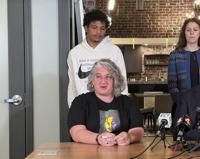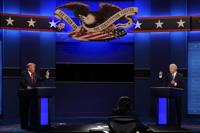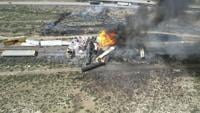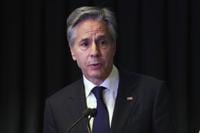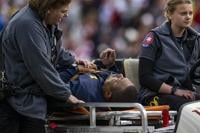KANSAS CITY, Mo. (AP) — Gregg Berhalter gave a single-word answer after the United States was eliminated from the Copa America with a loss to Uruguay when asked whether he was the right man to lead the Americans into the 2026 World Cup.
“Yes,” Berhalter said.
Plenty of others are sure to have plenty more to say about his future with the national team.
After a put the U.S. in a dire predicament, Berhalter's lineup of players from European clubs created precious few opportunities against Uruguay. And when Mathías Olivera found the back of the net for a questionable second-half goal, La Celeste walked out of Arrowhead Stadium with a 1-0 victory on Monday night and the Americans were left wondering how everything had gone so wrong.
“We're all going to do a review of the whole tournament and see where we fell short,” Berhalter said. “It's obvious the Panama game hurt us, put us behind the 8-ball, and I think collectively — the staff, the players, the sporting department — have to look at where do we improve. How do we get better? We know it's a talented team, one with big potential, and we didn't show it.”
Berhalter and the U.S. hoped to show the team had advanced since its round-of-16 elimination against the Netherlands at the 2022 World Cup. Instead, the U.S. managed only a and were upset 2-1 by the Panamanians.
“We had a good start and brought a lot of energy but at the end of the day, just not enough quality,” U.S. captain Christian Pulisic said. “I felt like we gave it everything but we just couldn’t score.”
Indeed, the Monday night came in the 66th minute when Nicolas De La Cruz swung a free kick in front of the American goal. Matt Turner parried a header by Ronald Araújo, who out-jumped defender Tim Ream, but the rebound went right to Olivera and he tapped the ball in with his left foot.
on the initial header but the goal stood after a video review.
Three minutes before Uruguay scored, the U.S. was in position to advance.
Bruno Miranda had tied the score for Bolivia against Panama in a game started simultaneously in Orlando, Florida, which meant the U.S. would only need a tie. But Panama went on to a 3-1 victory to claim the second spot in Group C behind Uruguay, and the U.S. was bounced from the group stage for the first time in 20 continental and global tournaments on home soil.
“This is still a young team. Still a lot of potential. But potential doesn't really matter if you go out on the pitch and you don't get the job done,” defender Antonee Robinson said. “Everyone needs to try and up the level, myself included.”
and given a contract through the upcoming World Cup, which the U.S. will co-host with Canada and Mexico. But despite a lineup that included Pulisic, Weston McKennie and Tyler Adams, the U.S. failed to even match its last Copa America appearance, when it lost to Argentina in the 2016 semifinals.
During the second half Monday night, the home crowd of 55,460 in less-than-full Arrowhead Stadium began chanting, “Fire Gregg.”
The U.S. next plays September friendlies against Canada and New Zealand.
“It wasn't only Copa America. It's learning from these high-level games we're playing pre-tournament,” Berhalter said, “and having this collective understanding that the margins are so small, and there is very little separating any of these teams.”
Uruguay played without coach Marcelo Bielsa, suspended for sending his team out late for the second half of its first two games. Diego Reyes and Pablo Quiroga were in charge on a mild but humid night in Kansas City.
Berhalter and the Americans knew the difficulty of their situation — Pulisic at one point said they would need to play “the best game of our lives” to advance — and they looked like a team with nothing to lose for most of the first half.
It was one marked by physical play and questionable calls.
Folarin Balogun, who had two goals already in the tournament, bore the brunt of several challenges. He was left calling for help after a collision with Uruguayan goalkeeper Sergio Rochet, then was left rolling on the field after Araújo’s challenge later in the half. Balogun eventually had to leave with a hip pointer and Ricardo Pepi took his place.
Uruguay lost Maximiliano Araújo earlier in the half after a scary collision with Ream near the U.S. goal. He had to be taken off the field on a stretcher, though he was able to move his arms before heading up the tunnel.
In the middle of the chaos was 32-year-old Peruvian referee Kevin Ortega, whose several questionable calls hurt the U.S.
The first came when Ortega began to pull a yellow card and stop play, then allowed it to continue — while still holding the card — as Uruguay nearly scored on an attack. The second came when the U.S. had a clear advantage after a hand ball on Uruguay, but the Peruvian referee eventually blew his whistle and called the play back for a free kick.
“This referee was awful,” Robinson said. “I've never seen a referee, you know, let a quick free kick go while he's got a yellow card in his hand. And it's literally embarrassing. And I hope something happens to him from that.”
Uruguay applied more pressure midway through the second half, then had the Americans in desperation mode after the goal. And while the U.S. had a few good runs and a couple of good opportunities in the box, a team that had such big expectations was unable to find the two goals it needed — or even one.
“The U.S. is a very strong team, but if you push us to play tough, we can do that,” Uruguay's Manuel Ugarte said. "And we can play beautiful (attractive) soccer as well. We adapt to the circumstances of the match.”
___
AP Copa America coverage:








